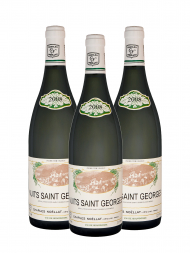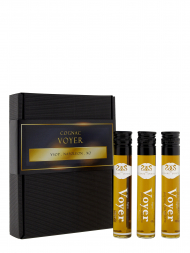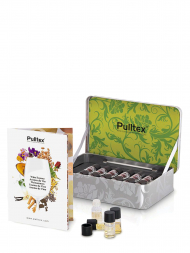10 Things Every Wine Lover Should Know About Henschke!
1. Lutherans fleeing religious persecution
The rich history of the Barossa and Eden valleys is partly defined by the diaspora of Silesian Lutherans who exited Europe in the mid-1800s. Fifth-generation winemaker Stephen Henschke is a direct descendant of Johann Christian Henschke, founder of Henschke Wines, whose journey brought him to settle in the region after departing from the village of Tschicherzig in Poland, under some duress. In 1841 the Henschkes landed in Australia and in 1862, after an initial period in the Adelaide Hills, Johann Christian purchased land in the Eden Valley at Keyneton, upon which the Henschke estate, homestead and winery still exists and operates today.
2. The beginning of winemaking
The first Henschke wine was produced in the 1860s. Stephen Henschke explains: "We don't really have a good record of when they made that first wine, but the property was built and expanded through the early 1860s, including the planting of orchards and vineyards." He admits "some might find it unlikely [but] the link between the northerly region of Silesia and winegrowing is documented."
The first Henschke wines were sold in 1868, and were produced from Shiraz, Riesling and likely Grenache and Mataro. The oldest continuing vineyard in the Henschke family suite of vineyards is Hill of Grace, planted in the 1860s.
Stephen Henschke and sixth-generation Johann Stephen Henschke, his son, now do the winemaking. "Their 'weapon' is the family's unfazed approach to their wine styles," explains Australian- and Japan-based ANA Airlines wine consultant and importer, Ned Goodwin MW. "And they stick to their guns when so many other producers are changing their line-ups at a whim."
3. That vineyard
Arguably Australia's most famous vineyard, and almost certainly Australia's most premium and recognized single-vineyard wine, Hill Of Grace was bought by Paul Gotthard Henschke in 1891. The vineyard was purchased from the Stanitzki family, who took possession of the land in 1873 from the original owners, the Flaxmans, who first were granted the land in 1842.
The vineyard is set on eight gently undulating hectares of land (20 acres), and set at 400 meters (1312 feet) above sea level. Native bush and the imposing and impressive Gnadenberg Lutheran Church, built in the 1860s, frame the isolated spot. The Stanitzki family first planted the oldest vines, affectionately called "the Grandfathers", in the 1860s. Planted on their own roots, the gnarled, old vines are dry-farmed and low yielding (averaging one tonne per acre), and form the basis for the remarkable Hill Of Grace wine.
Hill Of Grace is named for the German village of Gnadenberg to remind the early settlers of their Silesian homelands. Gnadenberg translates to Hill of Grace, but the grand irony is that there is no hill at the Hill Of Grace vineyard.

© Henschke & Co. | Meet the family: Prue, Johann and Stephen Henschke.
4. That wine
The first Hill Of Grace was produced by Cyril Henschke, Stephen's father, in 1958, which means the vineyards were almost 100 years old when the first wine was released. "An incredible thing to consider really," observes Stephen Henschke. "I think probably I look back to its planting and think why did anyone plant in this river creek, in this deep sooty soil, why such a fundamentally awesome decision?"
Fine Wine Principal for Woolworths Liquor Group, Andrew Caillard MW, says of Hill Of Grace: "It's the most significant vineyard site in Australia and represents the hopes, aspirations, efforts and care of generations. Its story is inextricably linked to South Australia's earliest colonial history and its survival is testament to a family's love and feeling of place."
The Shiraz-based wine commands one of Australia's highest prices for bottled wine, and is renowned for its distillation of the vineyard. It offers a true sense of place with a complex, finely wrought and lengthy mesh of dark berryfruit and exotic spice characters, all inexorably linked to those deep sooty soils and remarkable old vines.
5. Composts and moon cycles
All the Henschke vineyards are farmed biodynamically. Prue Henschke (Stephen Henschke's wife) is head viticulturist of Henschke. Since 1990, Prue has been using mulches and composts to enhance soil health, with full conversion of practices seen in the mid-to-late 2000s.
"Although we work with moon cycles and look to a balance of nature around and in our vineyards, it's also a scientific process for us," explains Stephen Henschke. "We've always been about traditional, minimal input and letting the vines produce well-balanced fruit, but making our own compost, focusing on vine and soil health. The replacement of inorganic fertilizers and ending the use of herbicides has created healthier environments for grapegrowing, and with healthier vines you get better quality fruit."
6. Career changes
Prue Henschke took on her current role as head viticulturist for Henschke in 1987, but her career began studying botany and zoology at Adelaide University. On the completion of her degree, she spent two years in Germany with Stephen, where he was studying at Geisenheim wine institute, and she became increasingly interested in viticulture and plant physiology.
During these formative years in Germany, Prue was a volunteer at the Botanic Institute at Geisenheim. Here, her work focus was with rootstocks, which began the segue into her current role, and now her field of influence. Various environmental and sustainability-focused awards have acclaimed her work.

© Henschke & Co. | Eden Valley lives up to its name as grapes ripen in the sun.
7. Winemaking with a European influence
A tour of the Henschke winery reveals a lot of traditional equipment, from old, wooden barrels and ancient-looking fortified wine casks to concrete tanks, and a feel of a winery in which little has changed, aside the odd bit of machinery. That said, Stephen Henschke doesn't shy from modernity although, when asked where his winemaking style is derived from, he does have feet firmly planted in the family's historical, European winemaking.
"All our fruit is minimally handled and sought for natural balance," he explains. "This is as much for structure, as flavor, [and] as balance in a wine; gentle winemaking and pretty natural processes are the basis for our work." New and older oak maturation occurs for red wines, while stainless steel and minimal oak is used for whites.
8. Yin and yang
While Hill Of Grace may be the wine that most know from Henschke, Mount Edelstone is the wine that sits close alongside. Stephen Henschke explains Mount Edelstone's significance: "My father started making single-vineyard wines in 1952, and Mount Edelstone was planted in 1912, which makes the first wines – back then, from 40-year-old vines – a pretty remarkable concept."
The 60th vintage of Mount Edelstone has been released this year. "No other wine in Australia has been made from a single vineyard for 60 consecutive vintages," says Stephen. "The vines are still vigorous at 100 years of age; this Shiraz wine is seriously significant." Like Hill Of Grace, Mount Edelstone is a dry-grown vineyard, planted on its own roots.
9. International respect
Andrew Caillard MW spends a significant time in foreign markets and comments: "Henschke is one of Australia's great wine marques. The reputation of Hill of Grace and Mount Edelstone distils through the portfolio although the energy fades towards the bottom tier."
While Ned Goodwin MW further qualifies: "For Henschke there is little traction in Japan, where Australian heritage still fails to evoke any sense of artisanship, dirty hands and quality, so to speak. However, there is good traction in the U.S., although perceived as 'old school but good school' which, to be frank, is not necessarily a bad thing. The wines are seldom seen in China, where Penfolds rules the high premium roost of Australian wine."
10. Not just reds
Though the suite of red wines from single vineyards is often the most widely-recognized for critical acclaim, the Julius Eden Valley Riesling has long held court among the cognoscenti as Henschke’s finest white wine offering. The Riesling comes from a vineyard of serious pedigree, and should be considered amongst the highest echelon of Henschke’s wines.
A second highly-regarded Riesling, Greens Hill comes from Henschke’s Lenswood property in the Adelaide Hills.
Purchased in 1981 and farmed biodynamically, the cooler Lenswood vineyards stretch out over 13 hectares at 550 meters (1800 feet) above sea level, and are home to Chardonnay, Riesling and Sauvignon Blanc in whites, along with Pinot Noir, Merlot and Cabernet Sauvignon for reds.
Published by Wine-Searcher.com
Discover our Henschke's selection here.
Categories
| All Categories | [71 posts] |
| General | [10 posts] |
| Life Style | [4 posts] |
| Wine & Liquor | [55 posts] |
Latest Posts
Welcome
Please confirm you are 18 years of age or older.
By entering this site you are agreeing to the Terms & Conditions.
Sorry!
You need to be at least 18 to visit our website.









